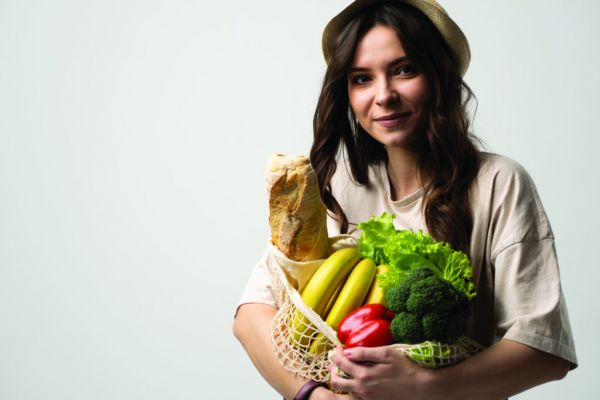Sustainability has become a hot topic for retail businesses and FMCG companies in recent years, but consumers are still more concerned with price and the cost of living. That’s according to the findings of research carried out by Bounce Insights on behalf of Checkout, which also reveals that shoppers are giving Tesco the thumbs up when it comes to sustainability.
The survey, which was conducted by Bounce Insights on 19 April 2023, targeted a nationally representative sample of 500 respondents across Ireland asking them various questions relating to their purchasing of sustainable products.
It revealed that price/the cost of living has the biggest influence on what consumers buy during their weekly shop (47.71%).
However, 37.38% of people ‘somewhat agreed’ that they are prepared to choose environmentally friendly/sustainable products over the brands that they usually buy.
36.59% of respondents have found that environmentally friendly/sustainable products are of the same quality as regular products, while 30.72% of respondents are ‘somewhat happy’ with the scope and quality of sustainable products that are available in their local supermarket.
And Tesco came out on top with the shoppers surveyed, with 30.14% of respondents claiming that Tesco is the most sustainable retailer when it comes to its range of products and the way that its stores are operated.
Question One:
Which of the following factors is the biggest influence on what you buy during your weekly grocery shop?
Price/the cost of living
Fresh and healthy foods (to cook from scratch)
Sustainable products and packaging
Convenient foods (for example, ready meals requiring little preparation)
Other
47.75% of respondents cited price/the cost of living, 31.51% selected fresh and healthy foods (to cook from scratch), 12.72% said sustainable products and packaging, while just 7.83% said that convenient foods, for example, ready meals requiring little preparation, was the biggest influence on what they bought during their weekly grocery shop.
Analysing these responses across the various demographics, there was no major difference between age groups.
However, with gender, out of the people who chose price/cost of living as the most important factor, 61% of those are female.
Out of the respondents who chose sustainable products and packaging as most important, 69% were male.
Question Two:
Do you agree/disagree with the following: ‘I am prepared to choose eco friendly products over the brands that I usually buy.’
Strongly agree
Somewhat agree
Neither agree/disagree
Somewhat disagree
Strongly disagree
32.09% of respondents strongly agree, 37.38 somewhat agree, 17.81% neither agree/disagree, 9.59% somewhat disagree, and 3.13% strongly disagree.
Older cohorts are more likely to strongly/somewhat agree with this statement.
Out of the respondents who strongly agree, 21.95% are in the 45 to 54 age group and 20.12% are aged 55 to 64.
In contrast, the 35 to 44 age group disagree, with 34.69% of the respondents who chose to somewhat disagree being in the 35 to 44 age group.
Of those who chose to strongly disagree, 43.75% of them were aged 35 to 44.
Females were a lot more likely to disagree with this statement.
Out of the respondents who chose to somewhat disagree, 63.27% are female and out of the respondents who chose to strongly disagree, 62.50% are female.
Question Three:
In your experience, how often are environmentally friendly/sustainable products of the same quality as regular products?
Always
Often
Sometimes
Rarely
Never
27.01% of respondents selected always, 36.59% selected often, 27.79% opted for sometimes, 6.59% said rarely, and 1.76% of respondents felt that environmentally friendly/sustainable products are never of the same quality as regular products.
Of the respondents who claimed that environmentally friendly/sustainable products are always the same quality as regular products, 57.97% were female, and of the respondents who said that they are rarely the same quality as regular products, 60% were female.
Question Four:
To what extent are you happy/unhappy with the scope and quality of sustainable products that are available in your local supermarket?
Very happy
Somewhat happy
Neither happy/unhappy
Somewhat unhappy
Very unhappy
32.88% of respondents said they are very happy, 30.72% are somewhat happy, 23.68% of respondents are neither happy/unhappy, 10.96% are somewhat unhappy, while 1.76% are very unhappy.
Analysing the responses to this question based on region, we could see that respondents in Dublin and Leinster were more unhappy with the scope and quality of sustainable products available in their local supermarket.
Out of the people who are somewhat unhappy, 37.50% are from Dublin and 30.36% are from Leinster (not including Dublin).
Out of the people who are very unhappy, 33.33% of those are from Dublin and 33.33% are from Leinster (not including Dublin).
Males are very happy with the scope and quality of the sustainable products available in their local supermarket, with 63% of the respondents who are very happy being male.
Question Five:
In your opinion, which of the following grocery retailers is the most sustainable regarding its range of products and the way its stores are operated (eg packaging, EV chargers, bicycle spaces, renewable energy for heating and cooling, use of recycled or recyclable materials)?
Tesco
SuperValu
Dunnes
Lidl
Aldi
Didn’t know
30.14% of the respondents named Tesco as the most sustainable grocery retailer in terms of its range of products and the way it operates its stores, 11.55% chose SuperValu, 12.72% chose Dunnes, 13.11% opted for Lidl, while 13.89% chose Aldi.
18.59% of respondents said they didn’t know which of these retailers was the most sustainable.
Out of the respondents who chose Tesco, 58% are male, and of the respondents who chose Aldi, 59% are male.
Looking at the age of the respondents who chose Tesco, 27% are in the 45 to 54 age group.
Analysis of the responses by region shows that, out of the respondents who chose Tesco, 34.42% are from Leinster (not including Dublin).
What Do These Findings Mean?
While sustainability has become a hot topic in recent years, particularly in the media and the corporate world, consumers are clearly still most concerned with price and the cost of living.
This indicates that if there was a choice between a sustainable product which was more expensive than another product, consumers would be likely to choose the cheaper option.
However, there was a strong sense that consumers are prepared to start making more sustainable choices and also an agreement that the more environmentally friendly options do not compromise on quality.
For the most part, consumers are also happy with the scope and quality of sustainable products, though there were some differences when comparing by region.
An overwhelming majority of those surveyed chose Tesco as the most sustainable retailer regarding its range of products and the way it operates.
Though consumers seem happy with what retailers are doing in terms of sustainable initiatives and products, there is room for improvement, and striking the balance between cost and sustainability will be key.
Interested in receiving insights like these yourself? Contact Bounce Insights today






